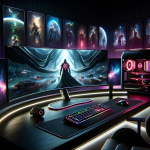Riot Games expands its universe by introducing Riftbound: League of Legends Trading Card Game, set to launch in October. This marks the company’s first entry into the trading card market, aiming to engage both avid League of Legends fans and trading card enthusiasts. With a diverse array of characters and strategic gameplay, Riftbound promises to deliver a new dimension to the beloved franchise.
Transitioning from its earlier phase under the code name “Project K,” Riot Games has now officially named its trading card game Riftbound: League of Legends Trading Card Game. This move reflects the company’s commitment to integrating the rich lore of League of Legends into a strategic card-based format, building upon initial concept developments.
What Is Riftbound: Origins Set?
Riftbound: Origins, the inaugural set of the trading card game, comprises 300 distinct cards featuring iconic League of Legends champions such as Jinx, Garen, Lux, Yasuo, Lee Sin, Annie, Viktor, Volibear, and Master Yi. The set is tailored for both traditional 1v1 matches and contemporary multiplayer formats like 2v2 and free-for-all, incorporating original artwork to enhance visual appeal.
How Does Riftbound Cater to New Players?
Designed with accessibility in mind, Riftbound includes a Proving Grounds starter set containing champions Lux, Annie, Master Yi, and Garen, facilitating an easy entry for newcomers. The game offers preconstructed Champion Decks and 14-card booster packs, allowing players to either jump into gameplay immediately or expand their collections gradually. Such features aim to lower the learning curve and encourage social play among new audiences.
“We’ve been incredibly humbled by the excitement and interest from players around the world who can’t wait to play Riftbound,” said Chengran Chai, executive producer at Riot Games.
Where Can Fans Experience Riftbound Before Release?
Prospective players have opportunities to engage with Riftbound through demo game events scheduled at upcoming Riot events and various tabletop gaming conventions. These events provide hands-on experiences, allowing players to preview the game’s mechanics and offer feedback, which Riot has incorporated to refine design elements and user interface based on community input.
“We’re grateful to the growing Riftbound community and the TCG players who’ve jumped in early to share their feedback including the call for more original art and refined UI. That feedback encouraged us to level up the game experience by revisiting some of our design decisions and conducting more playtests to ensure that we’re delivering a game that players will love.”
Riftbound stands as Riot Games’ strategic expansion into the trading card genre, leveraging the expansive lore of League of Legends to create a unique gaming experience. Unlike traditional releases, the inclusion of original art and support for multiple game formats aims to attract a wide audience. The proactive approach in gathering and implementing player feedback underscores Riot’s dedication to crafting a player-centric product, which could set a precedent for future iterations and expansions within the trading card market.










